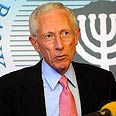
Bank of Israel Governor Stanley Fischer
צילום: גיל יוחנן
Fischer raises interest rate to 2.5%
Bank of Israel governor increases key rate by 0.25%, meeting estimates, following rise in inflation rate
Bank of Israel Governor Stanley Fischer on Monday raised the key lending rate for March 2010 by 0.25%, to 2.5%. The decision meets earlier estimates made by most capital market analysts.
This is the central bank's eighth increase since changing its interest rate policy in September 2009. Over this period, the key rate was raised by an accumulated rate of 2%.
The main reasons for the move are the ongoing rise in the expected and actual inflation rate and the accelerated activity in the Israeli economy. In the past 30 days, the expected inflation rate for the next 12 months jumped to 3.5%, compared to 3.3% in January and 3% in December.
The average inflation rate for the coming year predicted by analysts is lower, totaling 3%, although it is also on the upper limit of the 1-3% target annual inflation range set by the government.
The actual inflation rate, calculated for the previous 12 months (January 2011 versus January 2010), is also above the upper limit of the target inflation range – totaling 3.6%.
The decision was also affected by the accelerated growth in the Israeli economy. According to estimates published by the Central Bureau of Statistics last weekend, the last quarter of 2010 recorded a 7.8% growth rate in the Israeli economy. The growth rate for the entire year totaled 4.5%.
The accelerated growth, led by a sharp increase in private consumption, raises the inflationary pressure as well. Increasing the interest rate was aimed, therefore, to slightly cool down the economic activity and slow down the inflation rate.
- Follow Ynetnews on Facebook










